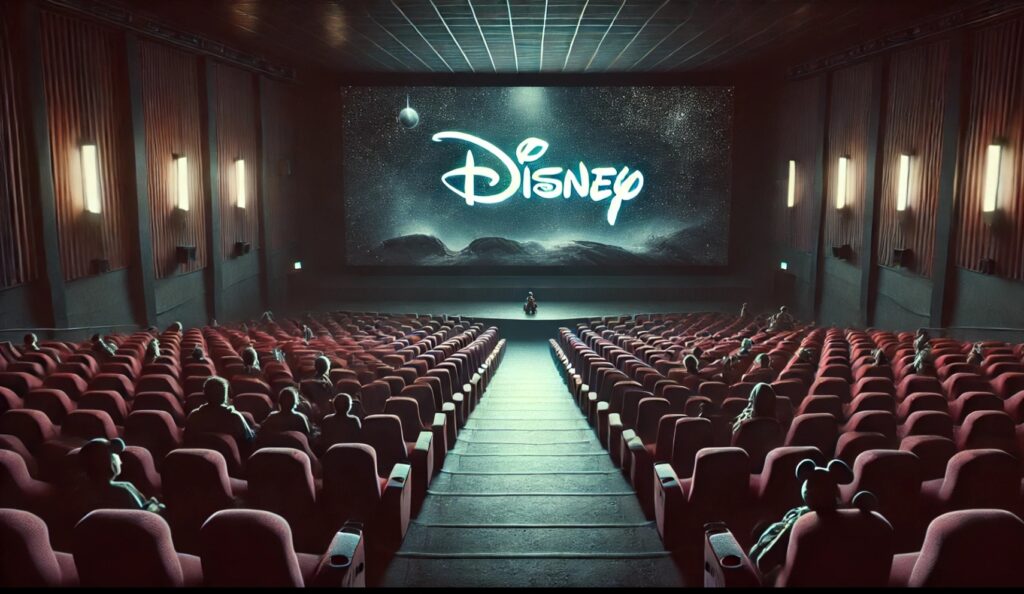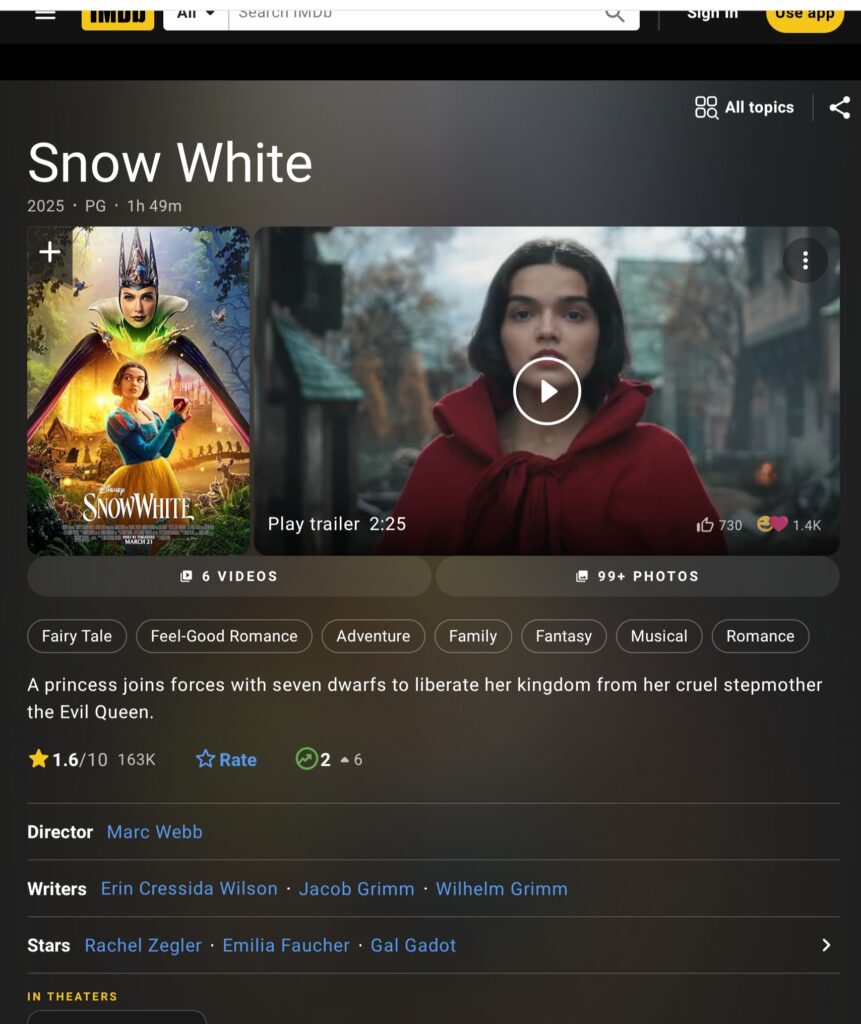For decades, Disney has been a dominant force in the entertainment industry, shaping childhoods and pop culture alike. From classic animated masterpieces to billion-dollar Marvel blockbusters, the company has a legacy of producing some of the most beloved films of all time.
However, in recent years, Disney has been making headlines for a different reason: its commitment to progressive themes—often labeled “woke” by critics—despite facing significant backlash and financial struggles at the box office. A prime example of this is the 2025 live-action adaptation of Snow White, which turned into one of the company’s biggest PR nightmares.
With audiences increasingly rejecting these reimagined classics, why does Disney persist? The answer is complex and tied to corporate ideology, changing market trends, and long-term influence over culture.
The Fall of Snow White (2025): A Case Study in Audience Backlash
Disney’s decision to remake Snow White and the Seven Dwarfs, the first-ever full-length animated film from 1937, was met with skepticism from the start. The casting of Rachel Zegler as Snow White and Gal Gadot as the Evil Queen sparked controversy, particularly after Zegler made dismissive comments about the original movie, calling it outdated and claiming that the new version would focus less on romance and more on “empowerment.”
These comments, combined with a complete overhaul of the classic story—including replacing the iconic seven dwarfs with a diverse group of “magical creatures”—only fueled fan outrage. The film quickly became a lightning rod for debates about forced diversity, political messaging in media, and Hollywood’s detachment from audience preferences.
When the movie finally released, the results were disastrous:
- On IMDb, Snow White plummeted to a 1.6/10 rating, making it one of the lowest-rated films in Disney’s history.
- Rotten Tomatoes critics gave it a 45% approval rating, reflecting mixed to negative reviews.
- Audiences handed the film a B+ CinemaScore, the worst-ever grade for a Disney live-action remake.
- At the box office, Snow White debuted to just $44.3 million domestically, far below expectations. With a $270 million production budget, the film was a financial disaster.
Clearly, the audience had spoken. But despite the overwhelming rejection, Disney appears to be doubling down rather than changing course.
Why Does Disney Keep Making “Woke” Films?
Many critics and audiences have asked the same question: If progressive, message-heavy movies keep flopping, why does Disney continue making them? The answer lies in a mix of corporate branding, long-term strategy, and financial safeguards.
Corporate Ideology and DEI Initiatives
Disney has made diversity, equity, and inclusion (DEI) a cornerstone of its corporate policies. The company regularly promotes these values in its hiring practices, storytelling, and partnerships. For Disney executives, making progressive films isn’t just about profit; it’s a reflection of the company’s evolving mission to be a leader in social change.
From The Little Mermaid (2023) casting a Black actress as Ariel to Eternals (2021) featuring Marvel’s first openly gay superhero, Disney views these choices as necessary steps toward a more inclusive future.
The Changing Media Landscape and Younger Audiences
Despite poor box office returns, Disney is banking on the long-term influence of younger generations. While many Gen X and Millennial audiences are critical of these changes, Gen Z and Gen Alpha are generally more accepting of progressive storytelling.
Disney sees these younger audiences as the future of entertainment consumption, particularly with the rise of streaming services like Disney+. Even if theatrical releases struggle, films with progressive messaging may perform better on streaming platforms, where younger viewers dominate.
Streaming and Merchandising: The Hidden Revenue Streams
Disney’s financial model doesn’t rely solely on box office success. The company makes billions through:
- Disney+ Subscriptions – Even if a movie flops in theaters, it can gain a second life on streaming.
- Merchandising – Toys, clothing, and theme park tie-ins often bring in more revenue than the movies themselves.
- Theme Parks & Licensing – Disney integrates new characters and IP into its parks and cruise lines, creating long-term value.
Thus, even if a film like Snow White fails theatrically, it still contributes to Disney’s broader brand ecosystem.
Hollywood Industry Pressure and Social Messaging
Hollywood as a whole has embraced progressive storytelling, and Disney, as an industry leader, is expected to follow suit. There is pressure from investors, media, and activist groups to produce content that aligns with modern social values.
Additionally, actors, directors, and writers in Hollywood increasingly prefer working on projects that reflect their personal beliefs and political views. If Disney were to completely abandon this direction, it could face internal pushback from talent and industry partners.
Tax Write-Offs and Financial Safety Nets
Even when a movie bombs, Disney isn’t necessarily taking a massive financial hit. Studios can leverage tax write-offs, insurance policies, and strategic cost-cutting to minimize losses.
For example, Warner Bros. outright canceled Batgirl (2022) for a tax break, and Disney has previously removed underperforming content from Disney+ to cut costs. The financial structure of Hollywood allows studios to absorb losses in ways that ordinary businesses cannot.
Will Disney Ever Change Course?
Given the growing backlash and financial disappointments, some signs indicate that Disney may be reconsidering its approach. CEO Bob Iger has acknowledged in recent interviews that the company may have “overreached” with its messaging and needs to focus more on strong storytelling rather than political statements.
Additionally, Disney has begun scaling back budgets for upcoming films, possibly as a response to audience fatigue with expensive, underperforming blockbusters.
However, whether this will result in a return to traditional storytelling remains to be seen. The company may simply refine its messaging rather than abandon progressive themes altogether.
The Future of Disney and Audience Expectations
Disney is at a crossroads. It can either continue doubling down on progressive storytelling despite declining box office returns or shift back toward the classic, universally appealing storytelling that once made it the king of Hollywood.
With Snow White serving as a cautionary tale, Disney must carefully consider its next steps. If the company fails to listen to audiences and course-correct, it risks further alienating fans and damaging its once-unshakable brand.
The question remains: Will Disney learn from its mistakes, or will it continue down this path, hoping that audiences eventually come around? The answer will shape the future of the company—and Hollywood itself.


